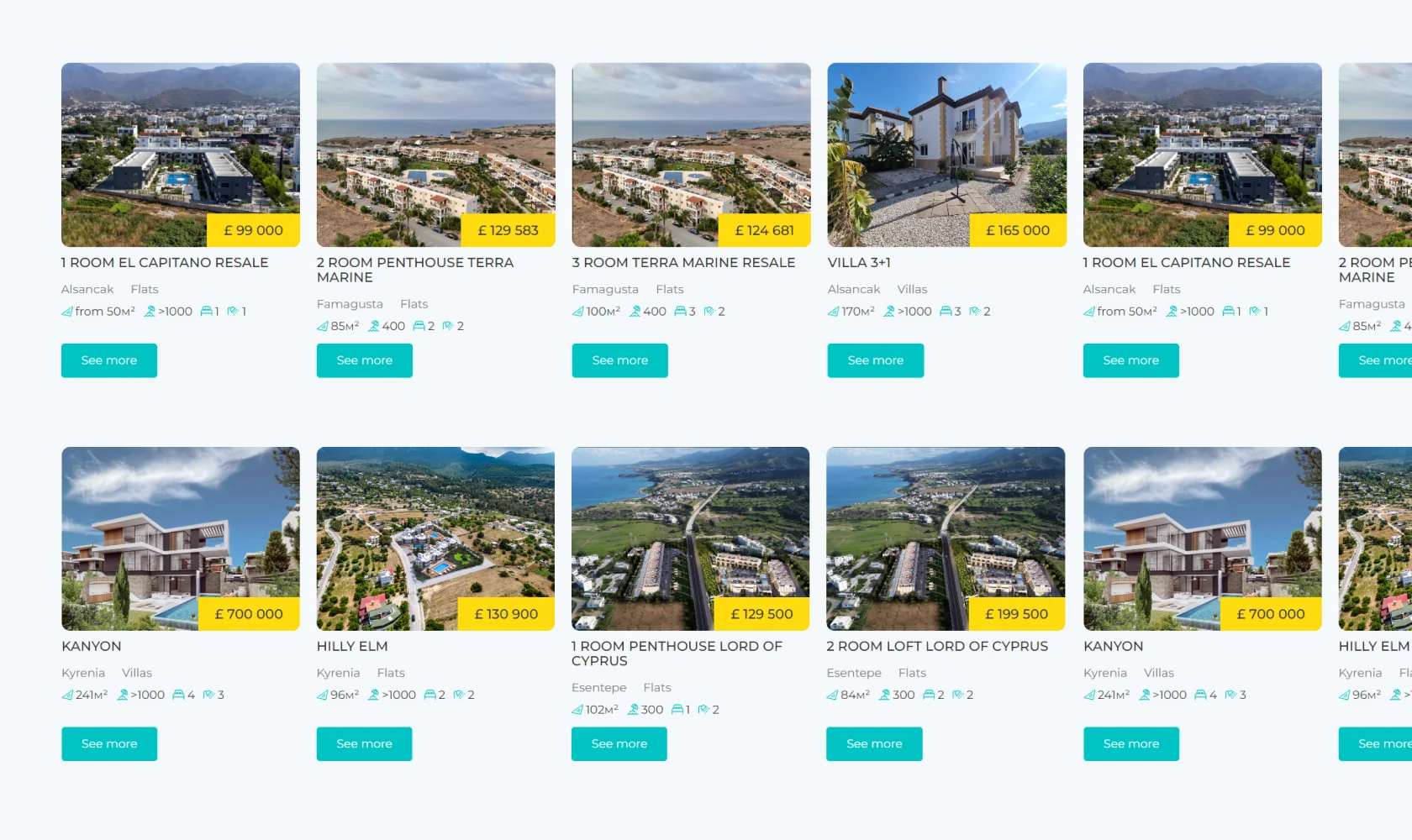Land titles in Northern Cyprus: Everything you need to know before buying a property
Real estate in Northern Cyprus attracts more and more foreign investors due to its affordable prices, mild climate, growing tourist potential and high liquidity. However, one of the key issues that future buyers are concerned about is the issue of land ownership. Northern Cyprus has a unique legal and political situation, which has influenced the structure of land titles — and this is the main difference from classic real estate transactions in Europe.
Understanding the type of title, its legal status, and its origin is critical when choosing an item. Not only the security of the transaction depends on this, but also your future opportunities: obtaining a residence permit, reselling it, renting it out, connecting utilities, and even protecting your rights in court.
There are different types of land titles in Northern Cyprus — and each of them has its own history, features and degree of reliability. In this article, we will discuss in detail:
- what titles exist and how they differ from each other;
- What are Turkish, equivalent (exchange) and trust (TMD) titles?
- what risks may arise for owners of certain categories of land;
- how to secure a transaction when buying an object in a new building or on the secondary market;
- and what documents must be provided by the developer or seller so that you can safely register ownership.
This information will help you avoid legal pitfalls, secure your investment and make an informed choice when buying a property in Northern Cyprus-whether it is an apartment, villa, commercial premises or a plot of land.
Main types of land titles in Northern Cyprus
After the partition of Cyprus in 1974, the issue of land ownership became particularly sensitive. In Northern Cyprus-recognized only by Turkey-a special system of property registration has been formed. There are five main types of land titles, and each of them has its own history, legal status, and risk level for the buyer.
I supplement the section “Main types of land titles in Northern Cyprus” with information and unique processing of data from агенства the Veles Property agency website, so that the text corresponds to the SEO format and is useful to readers.
Section extension: full description of all types of titles
In Northern Cyprus, there are five main types of titles registered in the Land Registry (Tapu Office). Despite the same document format, it is the historical basis of each title that determines its legal status and degree of protection.
1. Turkish title (Turk Koççanı)
This title was issued to citizens of Turkish nationality who own real estate in the territory that is now controlled by the TRNC, until 1974. Documents formed after the adoption of the law on land alienation and property registration in 1977 established their rights.
- Advantages:
- Absolutely reliable for legal transactions.
- Perfect for foreigners — no restrictions.
- It is widely accepted by banks and official structures.
2. Exchange title (Eşdeğer Koçanı)
The holders of this title — Turkish Cypriots who left the territory of the Republic of Cyprus after the 1974 conflict-received compensation in the form of points (puan), which were exchanged for land in the north. The title secures the ownership of the new owner of the land.
- Peculiarities:
- Available to foreign buyers.
- It often has a better price compared to Turkish Title.
3. Dedicated title (Tahsis Koçanı)ı)
This title is given to Turkish Cypriots or immigrants from Turkey who did not own property in the south before 1974. Land was allocated without taking into account the property fund, namely within the framework of state redistribution.
4.Mujahid title (Mujahit Koçanı)
A special type is intended for families of military personnel who were killed or wounded in the conflicts of 1974. They were awarded points (Mucahit Puan), for which they were given land in the north. This title emphasizes service to the Motherland and has a special legal basis.
5. English title (Ingiliz Koçanı)
A rare but existing type of title: it was issued to British citizens who owned property in Northern Cyprus before 1974 and retained their title documents. Their rights were recognized when registering land in the TRNC cadastre.
Legal status and title protection
All of these types of titles are protected by the Northern Cyprus Law and are subject to legislation (including Law No. 67/2005). It provides an opportunity to apply to the TRNCImmutable Property Commission in case of claims of previous owners. This is a special structure created in response to the decisions of the European Court of Human Rights.
It is important to note that despite the different history of origin, all types of titles are considered equivalent and reliable in the TRNC legal practice. They don’t really have any significant differences in terms of formal protection. Only the issue history differs.
Comparative table of titles
| Title Type | Source of Origin | Available to Foreigners | Features |
| Turkish Title | Pre-1974, Turkish Cypriots | Yes | Most Reliable |
| Exchange Title | Scores for Property in the South | Yes | Diversity of Demand |
| Tahsis Title | Relocation, No Property | Yes | Residential Appointments |
| Mujahid Title | Military Merit | Yes (rarely on sale) | Special Conditions |
| English Title | Before 1974, the British | Limited | Rare Title |
Legal security: how to check the title before buying
Buying a property in Northern Cyprus requires a thoughtful and professional approach. Even despite the affordable prices and attractive locations, the main task of the buyer remains the legal security of the transaction. One of the key stages is checking the land title. This step allows you to avoid legal risks and protect your investment.
1. Applying to a licensed lawyer
In Northern Cyprus, a mandatory stage of any transaction is accompanied by a lawyer. At the same time, it is extremely important that this is an independent lawyerwho is not associated with the developer or seller. Only in this case will you get an objective assessment of the item’s status and title.
The lawyer checks:
- History of the land plot and object.
- Authenticity and type of title.
- Existence of restrictions, encumbrances, or legal disputes.
- Compliance of property rights with cadastral data;
- Legality of obtaining construction and operating permits.
2. Obtaining an extract from the Land Registry (Koçan)
A koçan is an official document certifying ownership of an object or land. It says:
- Name of the owner.
- Land area and purpose.
- Type of title.
- Registration number and land plot.
- Possible restrictions or encumbrances.
Before signing the purchase and sale agreement, the buyer has the right to read the original Koçan, as well as request a certified copy.
In Northern Cyprus, a notarial transaction in the classical sense, as in Russia or European countries, is not a mandatory part of the real estate purchase process. The issue of registering ownership rights and drawing up a purchase and sale agreement is resolved differently here, and it is important to understand this in the context of the legal security of the transaction. Here’s how it works:
3. What is a notarial transaction and does it apply in Northern Cyprus?
A notarial transaction is the execution of a purchase and sale agreement with a notary, who certifies the will of the parties, the legality of the transaction and signatures. In countries where a notary serves as a state registrar (for example, in Germany, France, or Ukraine), this is a mandatory part of the process.
But in Northern Cyprus, notaries are not involved in real estate transactions. Instead:
- The entire process is handled by a licensed lawyerrepresenting the buyer’s interests.
- The lawyer prepares the purchase and sale agreement.
- After signing the contract, the applicant submits it for registration with the Land Cadastre (Tapu Office).
- This registered contract is legally binding and serves as the basis for further obtaining the Koçan (title).
What the buyer needs to know
- Notarization is not required, and in most cases it simply does not exist.
- The transaction is guaranteed by registration at Tapu Office, not by a notary.
- The lawyer actually performs the function of a notary: checks documents, titles, applies for a change of ownership, controls payments;
- For foreigners, registration through a lawyer is mandatory, especially taking into account the need to obtain a purchase permit from the Council of Ministers (at the Koçan stage of registration).
When can a notary be used?
Sometimes (for example, for loans, mortgages, or personal agreements between the parties), the parties can optionally notarize the documents. However, this does not affect the state registration of property rights, which passes exclusively through the cadastre and the Ministry of Internal Affairs of the TRNC.
If you want, I can reformulate or additionally embed this information in an already written article, so that it is clear why a notary is not needed, and how the buyer’s rights are protected.
4. Checking land permits and status
Some lands have agricultural, forest, protected or military status. Construction on such sites may be prohibited. Therefore, before buying a plot of land or a house, make sure that:
- The land is located in a permitted development area.
- There is an approved construction project.
- All approvals and permits have been obtained from the municipality and the Architectural Council.
What is the buyer’s risk if they don’t pay attention to the title type?
Externally, the property may look attractive: a new residential complex by the sea, developed infrastructure, promises of the developer. But if you do not check the type of land title — even the most beautiful property can turn into serious problems. Below we will analyze what risks the buyer may face.
1. Is it possible tolose ownership?
In the spring of 2010, the European Court of Human Rights transferred all its powers to the Real Estate Commission. It officially guarantees the security of every transaction in the TRNC. Prov property is legally fixed. With the introduction of such a commission, the loss of property rights is no longer possible.
2. Problems with transaction registration
If the property does not have a properly registered title or the land is not transferred to the category that permits construction, you will not be able to register the contract with Tapu Office. This means that you will not be officially recognized as the owner, even if the property was fully paid for.
3. Difficulties in obtaining a residence permit and utility connections
To obtain a residence permit on the basis of ownership of real estate, registration of ownership rights is required. If the title is not recognized or raises doubts, local authorities may refuse to connect water, electricity, Internet, as well as to process documents.
4. Impossibility of subsequent resale
The real estate market in Northern Cyprus is actively developing, and many buyers consider properties as an investment. But if the property has a “disputed” title, it will be extremely difficult to sell it-especially to foreigners or through international platforms.
5. Encumbrances and frozen projects
Some properties with undocumented titles or built with violations may end up under court arrest or with a temporary ban on transactions. If you buy without verification, you can become a hostage to legal disputes that cannot be resolved in a short time.
How to secure a deal: step-by-step recommendations for the buyer
Buying a property in Northern Cyprus is an opportunity for a profitable investment and a comfortable life in the Mediterranean climate. However, the legal features of the region require attention. Below are practical tipsthat will help you avoid problems and register ownership without risks.
1. Start by checking your title
Ask the seller or developer for a copy of the Koçan-a document confirming ownership of the land or object. Make sure that:
- Specify the type of title (Turkish, equivalent, TMD, etc.).
- The land is intended for residential development.
- There are no encumbrances or restrictions.
Ask your lawyer for a written opinion with the results of the audit.
2. Hire an independent lawyer
Don’t rely on a “recommended” lawyer from an agency or developer. Hire an outside lawyer witha license and experience in international real estate transactions in Northern Cyprus. They will carry out all the checks, draw up the contract, register the property right, and protect your interests.
3. Enter into a contract with the specified conditions
The contract must clearly specify:
- Passport data of the parties;
- Complete information about the object and title.
- Cost, payment terms, and terms of transfer of rights.
- Liability of the parties and penalties;
- Guarantees that there are no encumbrances.
It is recommended to notarize the contract, especially when buying from private individuals.
4. Register the transaction with the Land Chamber (Tapu Office)
After signing and paying, the transaction must be registered with the TRNC Cadastral Office. Without this registration, the buyer does not receive legal ownership rights. Only after making changes to Koçan do you become the official owner of the property.
5. Check building permits
If you are buying a property in a complex under construction, make sure that:
- The developer has obtained all construction licenses.
- Land has been moved to the appropriate category.
- The project was approved by the municipality.
- You have permission to connect to networks and communications.
It is better to buy real estate from developers with a good reputation, completed projects and open documentation.
Conclusion
Real estate in Northern Cyprus is not only about the sun, sea and favorable prices, but also features that are important to know about before buying. One of the key aspects is the type of land title, which determines the security of the transaction, the possibility of registering ownership rights and the prospects for using the object.
Various types of titles are available in the Northern Cyprus market — Turkish, equivalent(exchange), military and disputed (Greek before 1974). Each of them has its own history and level of legal risk. Therefore, even if an object seems attractive in terms of price or location, it is always important to find out what its title is and what its legal purity is.
Mandatory verification of documents, involvement of an independent lawyer and registration of the transaction in the cadastre are the steps that will ensure your peace of mind, the legality of ownership and protection of your investment. Do not skimp on legal support, especially if you are buying a property for the first time or do not know the nuances of local legislation.
A properly executed title means not only legal protection, but also confidence that you will be able to sell, donate or inherit your property without restrictions. That is why understanding land titles is an essential part of a competent approach to buying property in Northern Cyprus.












